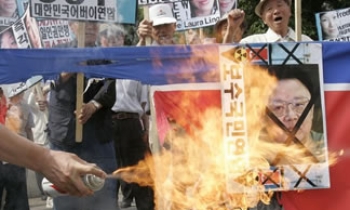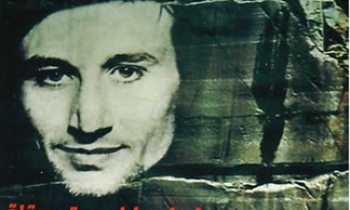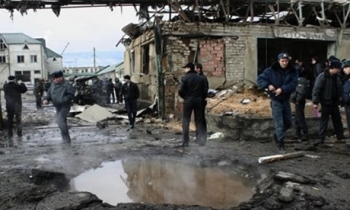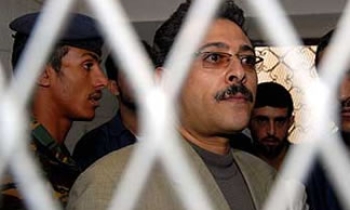The "Danish cartoon crisis" was quietly revisited at a conference at the Christiansborg Palace -- the beautiful building that accommodates the Danish Parliament -- in Copenhagen over the weekend. The conference, organized by the Danish Free Press Society and Jyllands Posten, the paper that printed the controversial caricatures, has revealed, sadly, that not only in Turkey but even in "more civilized" parts of the world, and possibly in the globe's entirety, the biggest obstacle to free speech is "ideological otherness."
Here are a few observations on the conference at which this columnist was one of the speakers, along with this paper's editor in chief, Yusuf Kanli, and fellow columnist Semih Idiz:
In a decent democracy, it is not the prime minister's job to apologize on behalf of a newspaper. No doubt, that's a good point. Although Mr. Kanli argued that freedom of expression must prevail but that people's (sacred or otherwise) values must also be respected, the Danish audience disagreed that there must be "no" limits to free speech, including even blasphemy. The Danish audience, however, did not make clear whether their understanding of limitless free speech included Holocaust denial and/or Armenian genocide denial, both of which are offenses in parts of the EU zone or Europe. There is consensus that the Muslim reaction against what Mr. Idiz calls the "Danish 9/11" had been largely underestimated. Tina Magaard, who made an excellent, "ideology/otherness-free" presentation, asks, "Why should we hate [the other] — just by seeing cartoons?" No one can probably argue against the idea, but Ms. Magaard talks of an ideal world, which is, unfortunately, not the one we are living in today. Also, Ms. Magaard logically argued that the depictions of the Prophet Mohammed in Jyllans Posten were caricatures of violent Islamists, not the others.
The question here is whether liberal European thinkers like Ms. Magaard would equally tolerate/defend, for example, a caricature of a Kurdish sheik/figure depicted as a terrorist, as there is even more substantiality for that, especially in a country where Kurdish violence claimed over 35,000 lives. Would she and others respect the argument that the hypothetical drawing of the "terrorist Kurd" would be a caricature of violent Kurds, and not the others? If the answer is an honest "yes" for the liberal Europeans, then there is no problem of hypocrisy. Otherwise, there is a very serious problem.
One very interesting question raised at the conference was whether there should be taboos in democracies, or no taboos. The unanswered question was probably whether free speech should include the right to offend. Fine, most Danes would probably answer "yes," and that must be respected. But would their "yes" include all taboos? Offending minorities? Offending underdog nations? Offending, even, the advocates of free speech? Michael Sanford of the Free Press Society underlined that the Muslim world does not have the tradition of self-criticism, "as the Christian world does." Empirical evidence probably justifies Mr. Sanford. Mr. Sanford also argues that as much as there should be "freedom of religion" there must be "freedom from religion."
Ms. Magaard challenges Samuel Huntington's "Clash of Civilizations" by arguing that what we see today is actually a clash between "democrats and theocrats." She quotes Article 24 of the Iranian Constitution that -- in theory -- allows free speech "unless expression of opinion violates the essentials of Islam" and consistently asks, in reference to the cartoon crisis, "Is this not forcing the Iranian Constitution into Denmark?" More importantly, Ms. Magaard asks a very tough and critical question: "The [ruling Justice and Development Party] AKP's party program contains references to Allah and [even more] references universal values of democracy and freedom of expression. When [Prime Minister Recep Tayyip] Erdogan talks about universal values, are we talking about the same values? Ms. Magaard continues to argue, quite rightfully, that Europe's enlightenment philosophy has not yet penetrated into large parts of (EU-candidate) Turkey and that "we must agree on what we mean by freedom of expression."
Ms. Magaard, when she asks that question in reference to Mr. Erdogan's "selective/ideological tolerance" to free speech, is perfectly accurate. Mr. Erdogan's inconsistencies on the limits of free speech are more than well known. But perhaps Ms. Magaard should also try to see the not-so-bright side of the picture in her "civilized and democratic world." It is, unfortunately, the same "otherness," the same "ideological division" that makes the vicious circle: the failure to agree on a standard definition of democracy because of "ideology." And, sadly, the more civilized European liberal thinking is no exception to that rule.
Evidence? A hidden piece, though, again, from the conference:
This columnist asked Lars Hedegaard Jensen, president of the Free Press Society and a prominent historian and journalist, whether he opposed the "violent" Muslim demonstrations -- the burning of the Danish flag, the setting ablaze of Danish diplomatic missions, attacks, ransacking et cetera -- during the cartoon crisis. Mr. Jensen's answer was a clear "Yes." His answer to a following question, though, was not as clear as the previous one:
--- "Would you also oppose any 'violent' demonstration no matter what its political motivation or justification?"
--- "Well, no — It depends on the [political] situation"
That answer, in practical terms, means only one thing: that one may oppose a "violent" Muslim demonstration against Danish assets for caricatures of Mohammed but may approve, for example, a "violent" Armenian/Kurdish demonstration against Turkish assets for reasons known to everyone. That is "selective liberalism," and it is very dangerous. Actually, it is the root cause of the clash of what Mr. Huntington thinks is between civilizations or what Ms. Magaard thinks is between the democrats and theocrats, or just any clash on the globe. Subjectivity tends to kill all nobility.
A hypothetical question-answer session with a radical Muslim would probably be like this:
--- Do you oppose Israeli violence against the Palestinians?
--- Yes, of course.
--- Do you also oppose Muslim violence against innocent Israelis, including children?
--- No, because they deserve it.
(!!!)
And another one with Kurdish "freedom fighters:"
--- Do you oppose undemocratic practices and unnecessary violence used by the Turkish state?
--- Yes, of course.
--- Do you also oppose Kurdish separatist violence?
--- No, because it's necessary.
(!!!)
The list may be extended endlessly. The sad thing is, if we are living in a world where even the most liberal, civilized thinkers are trapped by ideological subjectivity, there is probably not much hope left for the noble concept that was the heart of discussion in Copenhagen at the weekend.









